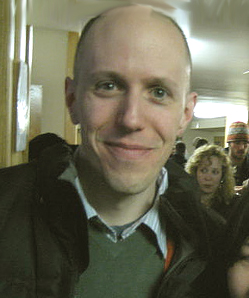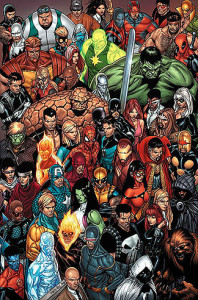Over at Grantland, Kevin Lincoln makes a deft observation about the current (sorry) state of Hollywood’s output, which has gone from “tight, gapless screenwriting” to scripts focused on world-building, sequels, expansion, rebooting—in other words, franchising.
Lincoln quotes screenwriter John August:
Most screenwriters are essentially world-builders, and the nature of screenwriting is to create a universe in which these characters live, so that’s really exciting for screenwriters … it’s this weird blend of wanting to create the best two-hour movie you possibly can and having to sort of function as a TV showrunner, charting out the whole series, even though as a screenwriter, you’re only going to get paid for that one movie.
I have some interest in how Hollywood screenplays are crafted. (Truth be told, I’m more interested in how three-act scripts are structured, Hollywood or otherwise.) What concerns me with Lincoln’s article—beyond the ouroboros death-spiral that is the quality of Hollywood filmmaking today—is how this world-building dynamic is present in fiction too, particularly ebooks, a universe I’ve been wading into over the past twelve months.
If you search Amazon for independently-published novels labeled “contemporary” or “literary fiction,” you’ll discover your options are limited. (Or, if you’re like me, you might say “the field is wide open.”) Genre fiction is a another story. Science fiction, mystery, fantasy, dystopian YA, romance (and so on) are well-represented in the world of independently-published ebooks. Over-represented, maybe.
Some see that as a knock on the quality of independent electronic-only publishing, but the same situation is found across the publishing spectrum. Hardbound, paperback, big name New York publishers, small press publishers, even vanity presses—genre outnumbers the contemporary/literary world by an order of magnitude. (At least in the realm of books. By my reckoning, literary magazines outnumber genre magazines by two orders of magnitude.)
Someday I’ll write up my thoughts on genre fiction, but for now I’ll say that I don’t see the above situation as a problem in particular. I would like to see contemporary and literary fiction better-represented in the world of independent publishing, but I’m just one voice in a sea of many.
Three acts? Or three (or more) books?
My problem is where August’s observation about screenwriting intersects with independent publishing. Having spent a bit of time searching blogs and so forth for tips on breaking into the world of ebooks, I’ve again and again seen two connected strategies emphasized: world-building and sequels.
What’s that mean? Build a world, a big world, and explore it over the course of several books. This strategy has been the cornerstone of comic books (“the Marvel Universe“) and genre fiction (“A Lt. Detective Malone Mystery”) for decades now. Hollywood is finally waking up to the possibilities. And so are ebooks.
The ebook marketing wonkthink goes something like this: Write a catchy, addictive first novel that introduces your main character, builds the world, and stocks it with complementary secondary characters to be developed later. Give the first ebook away for free. Then write sequels that continue the story and develop your pantheon. Progressively increase the price of your ebooks as the series grows. When you’ve published the last ebook in the series—or reached a natural breathing point—package them together as a “boxed set” (there’s no box, just bits) and price it higher still.
Done right, the individual ebooks may be priced from free to, say, $4.99. The boxed sets can be sold as high as $19.99—the cover price of a physical book in a physical bookstore. With Amazon’s KDP Select, the author pockets 70% of that $20 purchase price. Not bad.
That’s the theory, but are sequels and world-building producing great reads? I’m not a connoisseur of modern genre fiction so I can’t say. I’m curious what hardcore genre fans think. Personally, I recall in my teenage years picking up Book One of various science fiction series only to discover its entire purpose was to introduce characters and describe the world’s physics and technology—in other words, sell me on buying the rest of the series. No thanks.
I know this: I haven’t gone to a movie theater in years simply because I can’t stomach what Hollywood is shoveling out the door these days. (This comes from a guy who grew up collecting Avengers comics and praying for a movie version.) They’ve rebooted Spiderman three times. “With great power comes great responsibility.” Yeah, got it.
Does it work?
Looking over Amazon’s Kindle Top 100 (paid ebooks, not free) and mentally discarding editions released by major publishers (and therefore available in paper form), I do see a number of independent ebooks that are part of a series. However, they’re all the first volume in the series (save for one boxed set selling for $0.99). I estimate two possibilities, and they’re not exclusive:
- The authors are selling the first book but failing to maintain readership throughout the series.
- The authors are big enough names they can sell the first volume rather than give it away for free.
In other words, I can’t tell from this limited data set what to make of this situation. I will say it’s tough as hell to crack the Kindle Top 100, so kudos to the authors. Also, this exercise of mine is rife with problems, so don’t let it stand as the final word on anything.
Note that I’m not terribly interested in the profitability of this world-building strategy. I’m more curious how other writers attract—and keep—the attention of readers. Do you really have to write a multi-volume genre series to succeed? I hope not.
I love the idea of tight, gapless screenwriting. I love even more the idea of tight, gapless fiction. For whatever it’s worth, that’s what I’m trying to do here.

